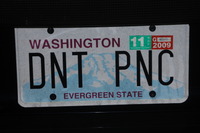

My name is David Robins: Christian, lead developer (resume), writer, photographer, runner, libertarian (voluntaryist), and student.
This is also my son David Geoffrey Robins' site.
 This first picture wasn't from the morale event, but it helped my morale (taken in the Microsoft parking garage, on the ramp going down from level 1). (It's a Hitchhiker's Guide reference—"Don't Panic!"—for those unfamiliar.)
This first picture wasn't from the morale event, but it helped my morale (taken in the Microsoft parking garage, on the ramp going down from level 1). (It's a Hitchhiker's Guide reference—"Don't Panic!"—for those unfamiliar.)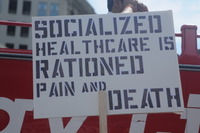 On Saturday we went to Westlake center in Seattle (4th and Pine) to protest a socialist healthcare rally (the rally was at the park, and they had the stage, since they had the permit; we gathered across the street). They were marching, and we met them, and we were louder, and possibly even more numerous, which is surprising since most of our group works for a living (so has less free time on weekends) and we were on the side that wasn't trying to get free stuff.
On Saturday we went to Westlake center in Seattle (4th and Pine) to protest a socialist healthcare rally (the rally was at the park, and they had the stage, since they had the permit; we gathered across the street). They were marching, and we met them, and we were louder, and possibly even more numerous, which is surprising since most of our group works for a living (so has less free time on weekends) and we were on the side that wasn't trying to get free stuff.
 We went out to SVRC this afternoon, after watching a few more episodes of Lost. It was a beautiful weekend. We took some paper targets (bull's eyes and some zombie and Osama figures) and some pop cans, and had some fun plinking, leaving about 1500 and getting back here about 1745.
We went out to SVRC this afternoon, after watching a few more episodes of Lost. It was a beautiful weekend. We took some paper targets (bull's eyes and some zombie and Osama figures) and some pop cans, and had some fun plinking, leaving about 1500 and getting back here about 1745.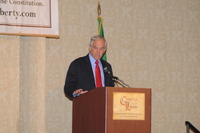
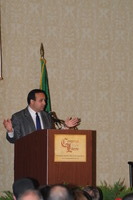 We went to see and hear Ron Paul at the Seattle Campaign for Liberty Conference tonight. We left our car at Microsoft and got a ride from Mark who we met at the last PSCU meetup. He was a little late, but we got there in time and heard Tom Woods (author of several books, the latest being Meltdown) and then Dr. Paul, who was excellent as always. Although the current outlook is grim in terms of the economy and our liberties, he also had a message of hope: the Campaign for Liberty is taking off, a solid grassroots movement of people that want to restore liberty to these United States.
We went to see and hear Ron Paul at the Seattle Campaign for Liberty Conference tonight. We left our car at Microsoft and got a ride from Mark who we met at the last PSCU meetup. He was a little late, but we got there in time and heard Tom Woods (author of several books, the latest being Meltdown) and then Dr. Paul, who was excellent as always. Although the current outlook is grim in terms of the economy and our liberties, he also had a message of hope: the Campaign for Liberty is taking off, a solid grassroots movement of people that want to restore liberty to these United States.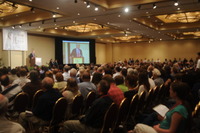
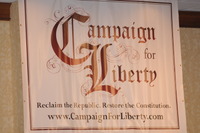 We also bought a couple white on navy Campaign for Liberty T-shirts and each got a button (badge).
Books finished: Man vs. the Welfare State.
We also bought a couple white on navy Campaign for Liberty T-shirts and each got a button (badge).
Books finished: Man vs. the Welfare State.And again, this quotation from p. 71 is also apropos:Clearly the great problem today is how to keep relief from getting out of hand. But how can we withhold relief from those who would merely rest idly back on it as a permanent way of life, and yet extend it to those who would use it to get back on their feet and once more become productive citizens? This is the baffling problem that I cannot hope to deal with here in detail. Our cities may find themselves compelled to return to some of the safeguards of former days that they perhaps too lightly abandoned—careful tests of needs and means and resources; aid in kind rather than in cash to make sure that the relief meets the particular needs it was intended to meet, particularly of children; a restoration of a residential requirement, to prevent people from moving to a city just to get immediately on its relief roll and to get more than in some other city; an obligation to do some sort of useful work in return for relief until a suitable private job can be found.
But there is a further way to hold down the relief rolls, and outstanding liberals of former days did not hesitate to recommend it. In 1914, A. V. Dicey, the eminent British jurist, asked whether it is wise to allow recipients of poor relief to retain the right to join in the election of a member of Parliament. And John Stuart Mill, writing in his Representative Government in 1861, did not equivocate:
I regard it as required by first principles that the receipt of parish relief should be a preemptory disqualification for the franchise. He who cannot by his labor suffice for his own support has no claim to the privilege of helping himself to the money of others. By becoming dependent on the remaining members of the community for actual subsistence, he abdicates his claim to equal rights with them in other respects.In fact, Mill went much further, and insisted that no one should have the right to vote unless he paid direct taxes:
It is also important that the assembly which votes the taxes, either general or local, should be elected exclusively by those who pay something towards the taxes imposed. Those who pay no taxes, disposing by their votes of other people's money, have every motive to be lavish and none to economize…. It amounts to allowing them to put their hands into other people's pockets for any purpose which they think fit to call a public one.In the political climate of today, anyone proposing that the right of franchise be suspended even for those on relief and merely for the time they remained on relief would be derided as having lost touch with political realities. Yet as long as the great and growing army now on various forms of relief and welfare programs retain the right to vote for those who promise them still more of other people's money, we may expect to see relief and welfare programs grow to the point where they eventually undermine the currency and bring on national bankruptcy. The reader will not find it difficult to think of countries where this has already happened.
What the guaranteed-income advocates are really saying, behind all their high-sounding phrases and humanitarian rhetoric, is something like this: "Look, we find ourselves with this wonderful apparatus of coercion, the government and its police forces. Why not use it to force the workers to pay part of their earnings over to the non-workers?"He also expends a chapter (14) criticizing the (so-called) progressive income tax, which I've written about in the past with the conclusion that the fairest tax is in fact a head tax: people (or corporations, for that matter) that make more don't generally use more services, so any income tax, even "regressive" (i.e. a fixed rate, like the flat tax), or a national sales tax (including the fair tax, while better than the current mess, are still proportional to something that has no bearing on services used. The statists have stolen a march by moving the goal posts: far from admitting any more that any tax proportional to income or spending is unfair and punitive, they are even unhappy with the current "progressive" system.

 I finally broke down and got a gas mower: a Toro 20333 (from Home Depot, and I was fortunate to buy it during a 10% off sale on Toro power lawn products). I read several reviews and comparisons online; I considered Honda and Craftsman as alternates, but read a few bad reviews about Hondas (such as tipping them causing them to fail, and my yard is slanted in places), and Toros were conveniently on hand at my local Home Depot (Redmond). The lawn and garden guy there (Wendell) was very helpful; the first time I went there their system shows 21 in stock but nary a one to be found (there had been one when I called the day before, but it sold); but they got them in the next day.
I finally broke down and got a gas mower: a Toro 20333 (from Home Depot, and I was fortunate to buy it during a 10% off sale on Toro power lawn products). I read several reviews and comparisons online; I considered Honda and Craftsman as alternates, but read a few bad reviews about Hondas (such as tipping them causing them to fail, and my yard is slanted in places), and Toros were conveniently on hand at my local Home Depot (Redmond). The lawn and garden guy there (Wendell) was very helpful; the first time I went there their system shows 21 in stock but nary a one to be found (there had been one when I called the day before, but it sold); but they got them in the next day.
 It started first pull (as advertised—I think they have a guarantee to this effect), and I mowed a path through my lawn, which was 18-22" today (I'd ignored it for a while). Even this new mower had some trouble with that (I was going to bag, but the first strip mowed filled the bag; tried to "recycle" the clippings (mulch) but it kept stalling, so eventually I put on the side discharge chute and all was well (carved up the grass like a knife through butter), although I'll need to rake the several inches of clippings covering the lawn later.
It started first pull (as advertised—I think they have a guarantee to this effect), and I mowed a path through my lawn, which was 18-22" today (I'd ignored it for a while). Even this new mower had some trouble with that (I was going to bag, but the first strip mowed filled the bag; tried to "recycle" the clippings (mulch) but it kept stalling, so eventually I put on the side discharge chute and all was well (carved up the grass like a knife through butter), although I'll need to rake the several inches of clippings covering the lawn later.